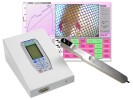Authors
J. Badia, T. Boretius, A. Pascual-Font , E. Udina, T. Stieglitz et al.
Lab
Universitat Autònoma de Barcelona, Physiology and Immunology, Department of Cell Biology, Bellaterra, Spain.
Journal
IEEE Transactions on Biomedical Engineering
Abstract
The transverse intrafascicular multichannel electrode (TIME) is intended to be transversally implanted in the peripheral nerve and to selectively interface subsets of axons in different fascicles within the same nerve. Two versions of TIME (TIME-2, TIME-3) were designed and tested for biocompatibility and safety in the sciatic nerve of the rat. TIME-2 was implanted in two groups: one group had only an acute implant and the second group had chronic implantation for 2 months; a third group was also chronically implanted with the TIME-3 version, designed to avoid the mechanical traction produced by muscles motion. We evaluated the functional and morphological effects of either TIME-2 or TIME-3 implanted in the rat sciatic nerve for 2 months. The results of the study indicate that implantation of the TIME-2 and TIME-3 devices in the rat sciatic nerve did not cause significant axonal loss or demyelination, as evidenced by the functional and histological results. The results of this study indicate that the TIME-2 and TIME-3 designs are biocompatible and safe after chronic implantation in a small peripheral nerve, such as the rat sciatic nerve.
BIOSEB Instruments Used:
Electronic Von Frey 4 (BIO-EVF4),Electronic Von Frey 5 with embedded camera (BIO-EVF5)

 Pain - Thermal Allodynia / Hyperalgesia
Pain - Thermal Allodynia / Hyperalgesia Pain - Spontaneous Pain - Postural Deficit
Pain - Spontaneous Pain - Postural Deficit Pain - Mechanical Allodynia / Hyperalgesia
Pain - Mechanical Allodynia / Hyperalgesia Learning/Memory - Attention - Addiction
Learning/Memory - Attention - Addiction Physiology & Respiratory Research
Physiology & Respiratory Research
 Pain
Pain Metabolism
Metabolism Motor control
Motor control Neurodegeneration
Neurodegeneration Cross-disciplinary subjects
Cross-disciplinary subjects Muscular system
Muscular system General activity
General activity Mood Disorders
Mood Disorders Other disorders
Other disorders Joints
Joints Central Nervous System (CNS)
Central Nervous System (CNS) Sensory system
Sensory system

